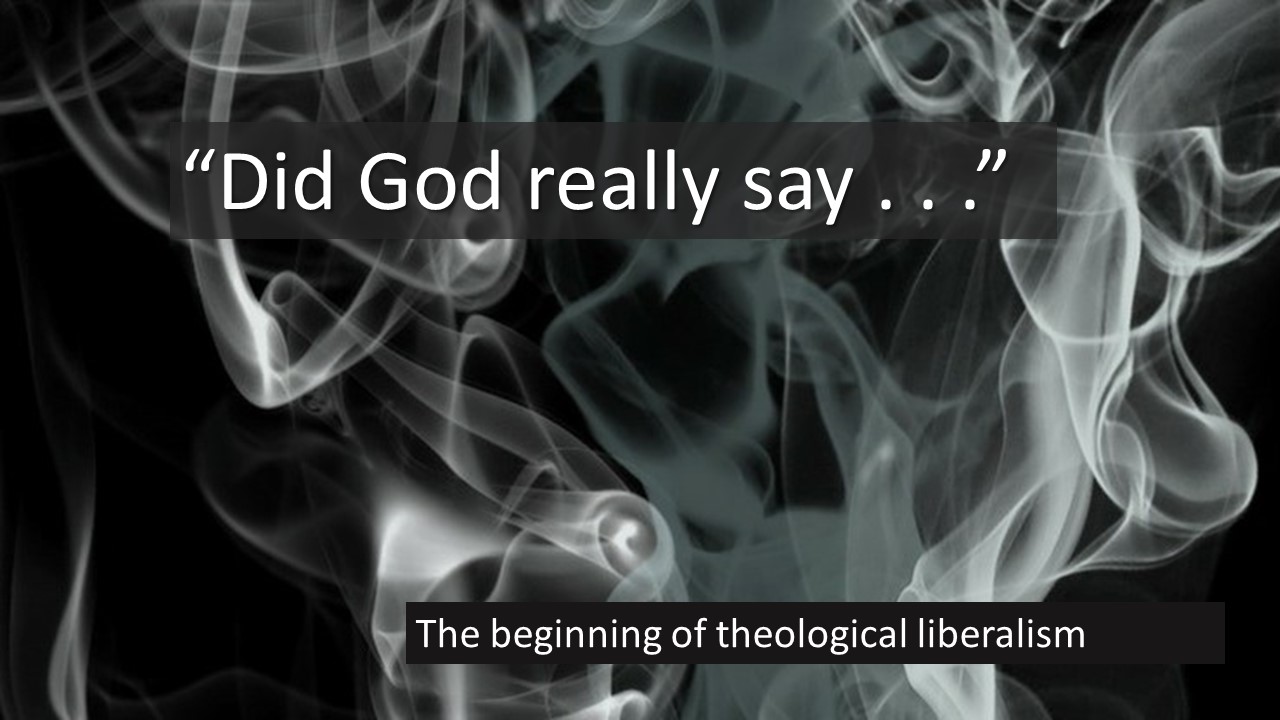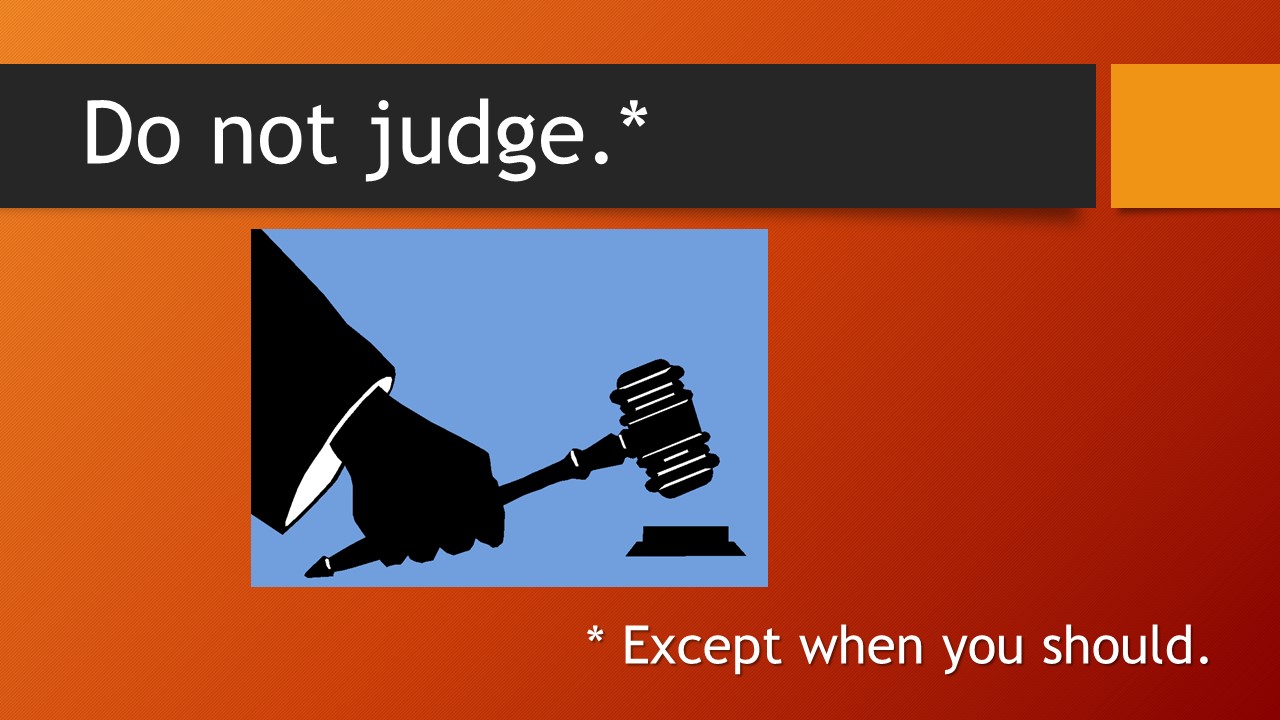The spirit of theological liberalism was first seen a long time ago. It appeared not in a dark cave, but in a splendid garden. Its first words were, “Did God really say . . . ?”
Since that tragic day, theological liberalism has been sowing doubt about the content, reliability, truthfulness, goodness, and authority of God’s words. And it has been doing this among God’s people by those claiming to represent Him.
What Prompted This Post
I read this question in
an OP for another thread on this forum: “What makes a person theologically liberal?” (Feel free to respond either here or there.)
I read over 100 replies. Some were quite helpful, but I still felt more should be said.
While the original question asked about theological liberalism, I am including theological postmodernism also. There is a great deal of overlap between the two. Both have the effect of eroding the authority of God’s Word in the hearts and minds of the people they influence.
Various Disclaimers
I’m aware that there are a wide range of people who self-identify, or are identified with, theological liberalism and/or postmodernism. They’re not all the same. Some may be true brothers and sisters in Christ.
I’m not talking about politics. Although there is a high correlation between theological liberals and political liberals in the US, they are not identical, and my focus here is on theological liberalism. More specifically, I’m concerned with those who claim to be Christians, but embrace and promote theological liberalism and/or postmodernism.
Being “liberal” on one issue does not mean a person, church, or denomination is liberal overall.
Despite their errors, liberals sometimes do good and sometimes are used for good purposes by God.
While I recognize these “disclaimers”, I do not want to water down the truth about theological liberalism and postmodernism. These are some of the most serious and widespread sources of false teaching within Christianity. They distort God’s truth, and in the process lead many astray.
Short Definitions
Theological Liberalism: teaching which undermines trust in the truthfulness and authority of the Bible by compromising with modern beliefs, morals, and/or values which are contrary to God’s Word.
Theological Postmodernism: teaching which undermines trust in the truthfulness and authority of the Bible by compromising with postmodern beliefs, morals, and/or values which are contrary to God’s Word.
Both liberalism and postmodernism usually begin not with outright denials of the truth of the Bible, but with sowing doubt about its truthfulness. However, in settings where it is advantageous to their cause, they do go on to explicitly deny many Bible truths and teachings.
Examples and Indications of Theological Liberalism and Postmodernism
A teacher, church, or institution claiming to be Christian, may be theologically liberal or postmodern if you see any of the following.
* They cause doubt about whether the books of the Bible which name their authors were actually written by those historical people. For example, if someone causes doubt about whether Paul wrote 2 Timothy, they have been influenced by theological liberalism.
* They question the truthfulness of any account which is presented as historically real in the Bible. Examples would be Jonah being swallowed by a fish, the virgin birth, and other miraculous stories throughout the Bible.
* They question the need to win people to the Christian faith from other religions, such as Islam and Hinduism.
* If someone believes or teaches that any sexual act between two men (or between two women) is not sinful, they are theologically liberal/postmodern.
* Belief in unguided evolution as a correct explanation for the appearance of life and for all the types of life we see today is a strong indicator of theological liberalism.
* All, or nearly all, theological liberals deny the Bible’s teaching that husbands are to lead in a marriage and that only men should serve as Senior Pastors in the church. However, there are some Christians who are truly evangelical and theologically conservative overall who are wrong on this one issue.
* Postmoderns often undermine the Bible’s teaching that the death of Christ on the cross meant that He was acting as a substitutionary atonement on our behalf.
* If you are reading something on one of the above topics and the author’s view seems unclear and confusing, it is very often the case that the author is theologically liberal or postmodern. A lack of clarity is sometimes just poor writing. But a lack of clarity is also a trademark of some postmodern writing. Their writing causes doubt about things that are clear in God’s Word, while intentionally being worded in such a way that allows the author to avoid an accusation of outright heresy. This is especially common when postmodern authors desire to continue to be accepted by, and to be able to have influence among, evangelical Christians.
How to Guard Against and Respond to Theological Liberalism and Postmodernism
The best defense against the doubt, confusion, and errors of theological liberalism and postmodernism is to read, study, believe, and teach all of God’s Word.
If you know someone going down the path of theological liberalism, do all you can to gently, but clearly, win them back to the truth.
Christian teachers, authors, and leaders who promote theological liberalism should be opposed as false teachers.
If you find yourself in a liberal or postmodern church or denomination, unless you are called by God to fight against these errors by staying, get out! Get into a church that believes that all of the Bible is really true.
In applying these principles, be careful not to become divisive over minor issues or doctrines which many truly theologically conservative, evangelical Christians disagree on. Although they may be mistaken, someone is not a false teacher just because they have a different view from you of the age of the earth, or a different understanding of the millennium, or a different way to explain God’s sovereignty and man’s responsibility. In your zeal for the truth (which is good!) do not neglect to also have a passion for unity among true believers.
A Few Verses to Meditate On
NIV
Genesis 3:1 Now the serpent was more crafty than any of the wild animals the LORD God had made. He said to the woman, "Did God really say, 'You must not eat from any tree in the garden'?"
NIV
Matthew 7:15 "Watch out for false prophets. They come to you in sheep's clothing, but inwardly they are ferocious wolves.”
NIV
Matthew 24:11 and many false prophets will appear and deceive many people.
NIV
Acts 20:30-31 Even from your own number men will arise and distort the truth in order to draw away disciples after them. So be on your guard! Remember that for three years I never stopped warning each of you night and day with tears.
NIV
2 Peter 2:1 But there were also false prophets among the people, just as there will be false teachers among you. They will secretly introduce destructive heresies, even denying the sovereign Lord who bought them-- bringing swift destruction on themselves.
NIV
2 Timothy 3:16 All Scripture is God-breathed and is useful for teaching, rebuking, correcting and training in righteousness,
NIV
2 Timothy 2:25 Opponents must be gently instructed, in the hope that God will grant them repentance leading them to a knowledge of the truth,
This is slightly modified from a post on my blog.


